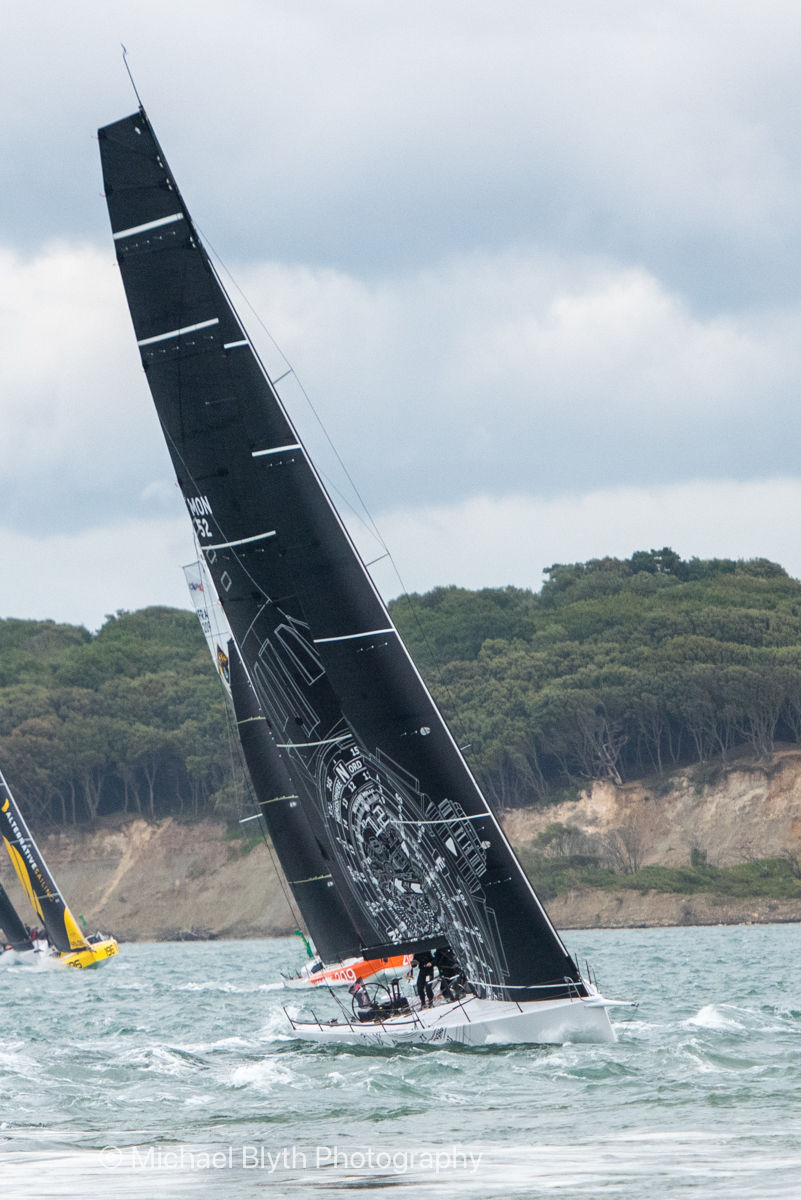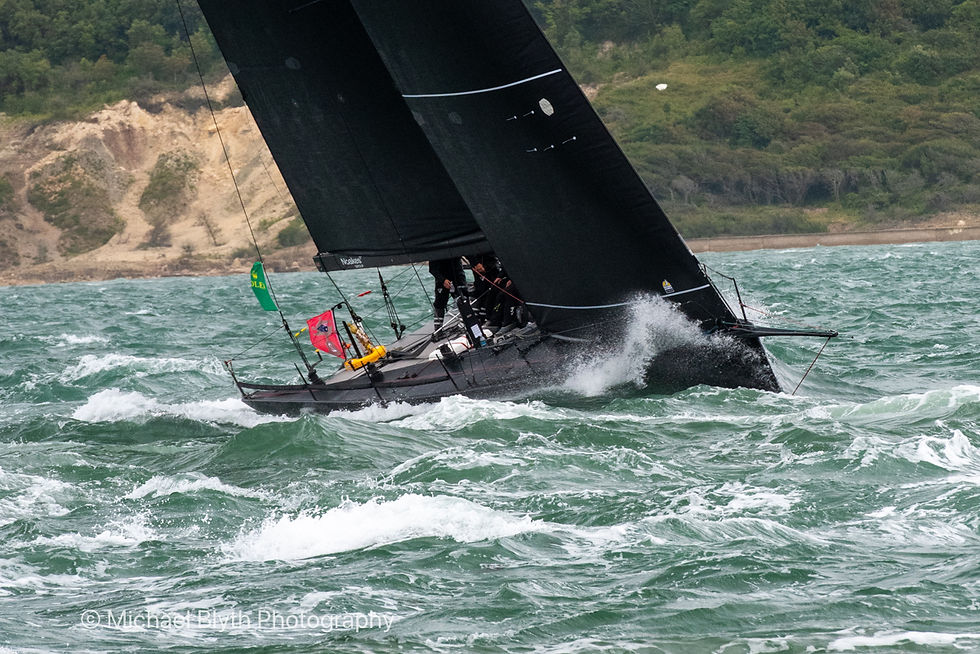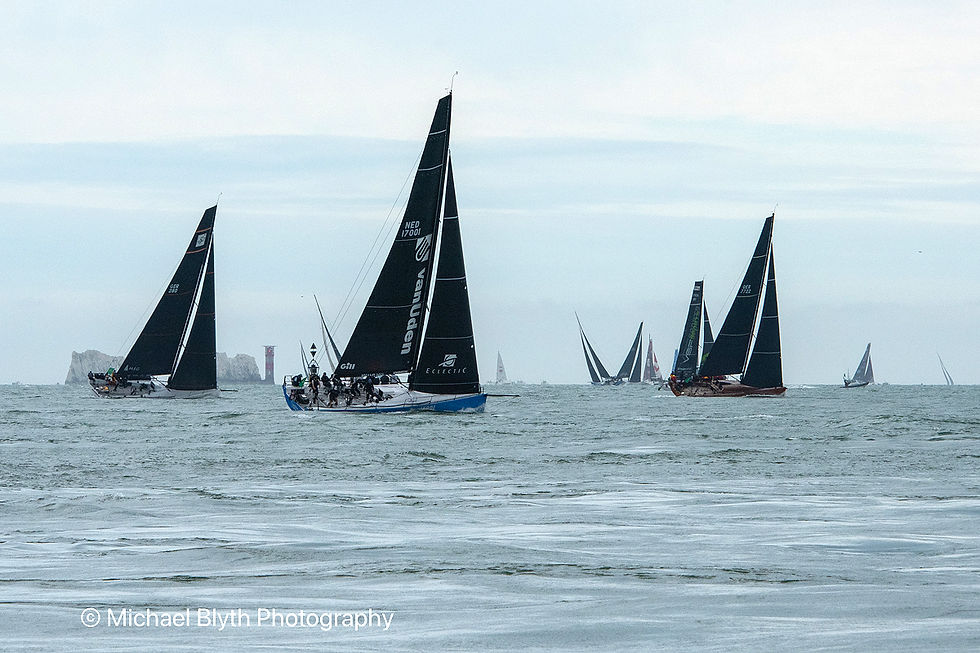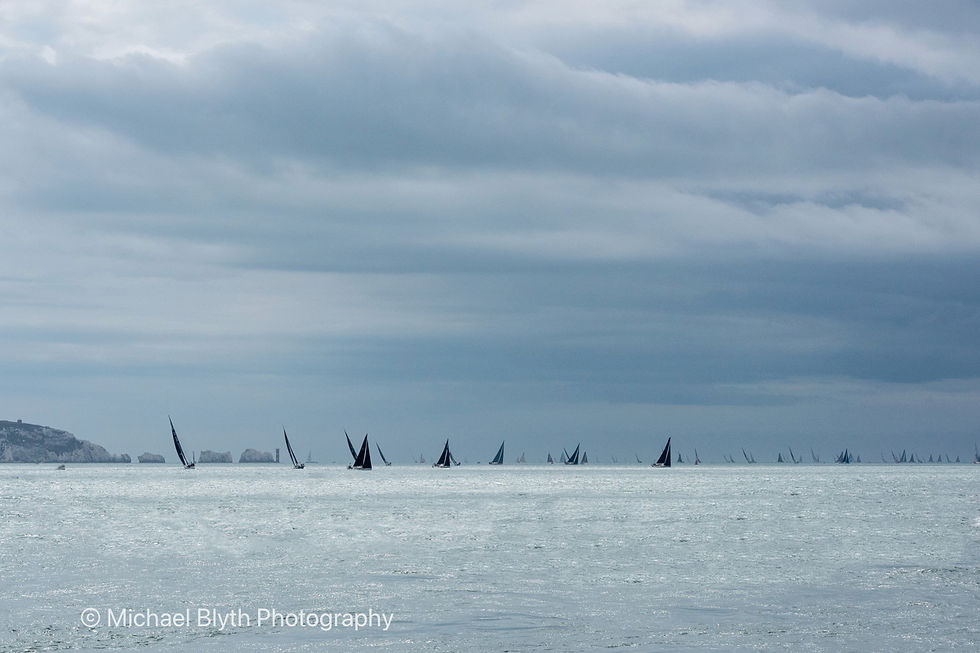Simple Photography Tips - yacht photography from the shore - Admirals Cup 2025
- Michael Blyth

- Aug 6, 2025
- 6 min read
Seven simple photography tips on getting exciting yacht photographs from the shore - Camera and Phone Camera
Composition is King
When photographing boats close-too, be aware that they may tack suddenly, the sails will cease to be taught and you'll have lost the image
If you have the option set your phone or camera to show a 'thirds' grid, it makes it easier
Close to, it's like taking a portrait, further off it becomes landscape photography
Heeling away from you can be a great point to photograph the crew sitting over the side - especially of they're your friends
Be prepared to move a few metres when you see a yacht is heading to a slightly different point on the shore
Practise a lot to get the bows throwing up a bow-wave
This quote from the LinkedIn introduction to my previous article, using images from the Fastnet Race 2025, received quite a lot of support from a range professional photographers. I thought I'd do another article with images taken of the last race in the Admirals Cup Series 2025, in which the competing yachts take part in the Fastnet.
"Although using a power boat would give more flexibility, using a relatively static site, in this case Hurst Castle Spit, with a known background has advantages of stability"
These Simple Photography Tips look at four basic zones when photographing a yacht race. The first is reliant upon being in a position where they come close to you, perhaps only a few meteres away.

Image One shows the Admirals Cup Winner Jolt3, heading through the narrows at Hurst Point, a few miles from the start at Cowes.
It is in what I would class as Zone Two, very close, but not so close that you can get in-your-face images as in what I call Zone One.
This image is only possible from a land base when the sea and wind conditions are such that it is of tactical advantage to the yachts to come in close before tacking back across the channel, or in this case a turn of a few degrees to avoid the rocks, but to remain close-hauled in the favourable water / wind conditions.

Similarly Image Two, with the Australian yacht Back 2 Black, the closeness to the shore allows a dramatic shot from an angle that might be too dangerous for a boat-based camera to approach.
The use of landscape format over portrait, has allowed me to highlight the bows slicing through the waves produced by wind-over-tide.
If you're attempting this sort of drama, it takes luck, practise or expertise to capture the bows at the right moment, and that bow -wave that really fires up the image.
Luck happens, but rarely, practise produces expertise - eventually.

Zone Two is illustrated in the next three images, where the yachts have turned and are heading away..
The beautiful German Yacht Elida, with hull built of engineered timber/carbon laminate, and deck of carbon, is an image that is possible when sailing close-hauled and having just tacked away from the shore.
It's also a good angle if you've been commissioned to capture friends racing - they all sit on the windward side, and if they know you're there.........smile for the camera!

In Image Four, the side by side racing of these two yachts make this image more exciting. Jolt 3, one of two Monaco entries sailing under the signage of Richard Mille, in the lead by a metre or so over Rafale. Combined by their proximity and the way they lean in unison, gives a dramatic edge to the image.

In image Five, Jolt 3, is competing with the young racing crew on Van Uden, a yacht on which my youngest daughter competed a couple of years or so ago.
Both images Four and Five illustrate the wealth of reasonably close to shore images that can be obtained from the shore itself.
This image is almost in what I would label 'Zone Three' where there is more visual space around the yachts, If the background were more attractive than it is, it would add to the picture, but it's not that good.
What this composition does do though is put some space to the right, into which the yachts appear to be sailing, giving perhaps, a greater impression of speed and journey.

Image Six is very much into Zone Three, where it's becoming landscape photography rather than 'portraits' of yachts'.
The use of a reasonably wide angle lens brings the background and potentially the foreground, into the image. Unlike the previous image where the background is from another world than yacht racing, this has The Needles as a background.
I wondered just how significant this feature is to the world of yachts and other things that float with intention. Did a quick search on that modern version of Encyclopaedia Brittanica - the internet. The Pilot to the Isle Of Wight has this to say:
"The Needles are perhaps the most distinctive coastal feature in the UK, three jagged saw-teeth of chalk jutting out into Christchurch Bay with a famous lighthouse marking the western extremity of the Isle of Wight. Early 17th Century charts show a series of needle-like chalk stacks on the The Needles’ northern side. Last of these was a 37m (120ft) chalk spike known variously as Lot’s Wife and Cleopatra’s Needle, and it collapsed in 1764 with a roar that was heard in Portsmouth". Yachting Monthly 2012
Callisto, to the left of the picture is at a similar distance from me, as the yachts in the previous couple of images, Van Uden and Elida have sailed into the region where they are becoming just a group of yachts of doubtful identity, and part of the landscape. This is also the zone into which some phone cameras can become involved - my daughter's Iphone 16 Pro produced some very good images at this sort of setting.
If you read my blog on the Rule of Thirds, you may remember that I strayed - something not uncommon with whatever neural divergency I have - into the realm of 'leading the eye'.
Here the relative sizes of the yachts form a visual triangle that leads the eye out of the right edge of the picture, giving the 'going somewhere else' feeling.

Image Seven shows most of the yachts in the almost 'landscape' area of Zone Three.
Unlike the previous image where yacht Callisto is very much dominant, and there is significant triangular composition, here Van Uden is slightly less dominant, and the imnagedoes not have real fizz,
Another tip, although The Needles are present, Van Uden has, in the picture, passed them and is pointing beyond. Their significance is gone - although I did take care to wait until the lighthouse was visible.
To my mind, this image has far less interest,

Image Eight is one of those exciting images where the different parts come together to make a better 'whole'. Especially with the apparent drama as Bedouin heads towards Hound.
The Needles and western end of the Isle of Wight form a backcloth, the light is amazing, and the black sails add fantastic contrast.
I'm not the greatest fan of carbon fibre sails - colour wise - but they do make this image into a picture with huge interest.
I would put this image into Zone Four, predominantly a landscape picture, but with real mid-image interest.

Finally we come to Zone Four. This is almost completely a landscape image, but with real interest provided by the sails and the Needles, which have almost melded into one on the horizon, This group compositionally sits on the lower horizontal third.
What makes it work? Well apart from the use of thirds compositionally, there is the shine on the water in the foreground, which contrasts with the quite sinister clouds. Divided by the line of interest.
Very much within the realm of the I-Phone or whatever is your favoured, and even better with a proper camera.
If you would like to try some yacht photography - Ocean Race Europe 2025, which starts from Kiel, has it's UK stopover in Portsmouth, It leaves on the 17th August.
See you there!

Comments